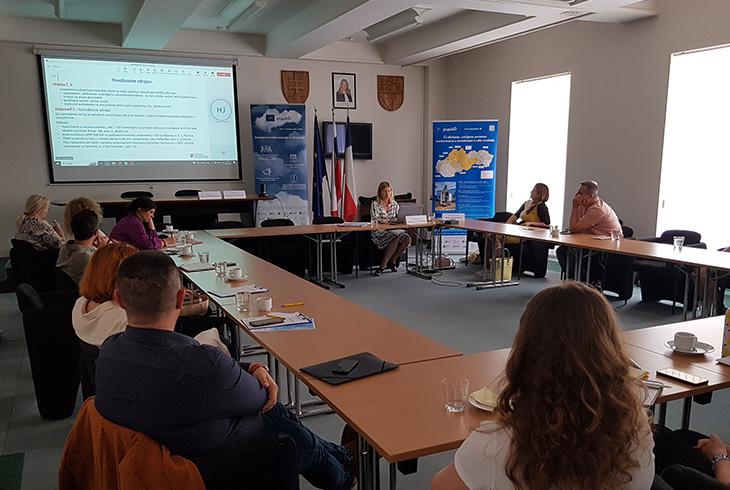

New
Air quality in our regions
26. 06. 2024
![]() Air
Air
In May, the Slovak Environment Agency, in cooperation with the Ministry of the Environment of the Slovak Republic and other partners of the LIFE IP - Air Quality Improvement project, organized three regional workshops focused on air quality for representatives of local governments from the Košice, Žilina and Banskobystrica self-governing regions (KSK, ŽSK,BBSK).

The aim of the workshops was to point out the possibilities of improving air quality in the region of KSK, ŽSK and BBSK, which belong to the regions with the highest number of municipalities with deteriorated air quality, and to create a space for mutual sharing of experiences with the introduction of permanent measures and activities in favor of clean air.
The participants were informed by E. Hroncová from SHMÚ about the current state of air quality in the given region. Problems persist when the limit value for health protection is exceeded for the pollutant PM10 and B(a)P. Air pollution is mainly caused by heating with solid fuel in households, in the Košice region industrial activity - US Steel - also contributes to the pollution.
The key to success is the correct application of legislative requirements to minimize emissions from small sources of air pollution. J. Hrubá from the Ministry of the Environment of the Slovak Republic reported on the application practice of legislation on air protection. The presentation explains the procedures for permitting small sources of air pollution, as well as the requisites of permits, as well as solutions in the event of identifying the incorrect height of the chimney for sufficient dispersion of emissions.
Air pollution by heating in households is a problem throughout Slovakia. Here, education is extremely important in order to make the population aware: to supply heat in their homes with the achievement of good air quality. J. Paluchová from SEA spoke in her presentation about the LIFE project, which currently focuses on environmental education. An "Educational Package" was introduced, which is intended to help municipalities achieve positive changes at the local level through various communication products.
A representative from Energia Real, Z. Miko, presented a solution for the near future, how to minimize air emissions from heat production in cities. The solution mainly affects apartment buildings and is based on the use of heat from waste water as well as the heat of the air that leaves the residential premises during its controlled exchange.
Failure to maintain a sufficient height of the chimney is often a decisive factor in air pollution in municipalities. In his presentation, V. Carach pointed out, using 3 examples from real life, what kind of polluted air the residents in the immediate vicinity of such a source breathe. In some cases, the concentration for PM10 was above the warning threshold, when a serious smog situation is declared.
In Žilina, the representative of the municipality of Oravská Polhora, J. Kvasniak, presented the municipality's active approach to reducing the energy consumption of buildings, which achieves a higher standard of living for the residents of the municipality and better air quality. The municipality actively uses the available financial mechanisms, and in some public buildings they succeeded in renovating the existing boiler rooms for solid fuel (original) on biomass boilers, reducing the energy demand by insulating the shell and replacing doors and windows. The investment in heat pumps also paid off. The management of the village tries to positively influence the inhabitants so that they reduce the energy consumption of their households in their own interest. New buildings in the village use heat pumps for water heating and heating.
In order to achieve an improvement in air quality, it is essential to ensure sufficient resources to finance appropriate measures. Workshop participants were introduced to J. Čaplová, respectively. J. Pekár from the Ministry of the Environment of the Slovak Republic, with potential financial mechanisms that could be used in the implementation of measures to improve air quality.











